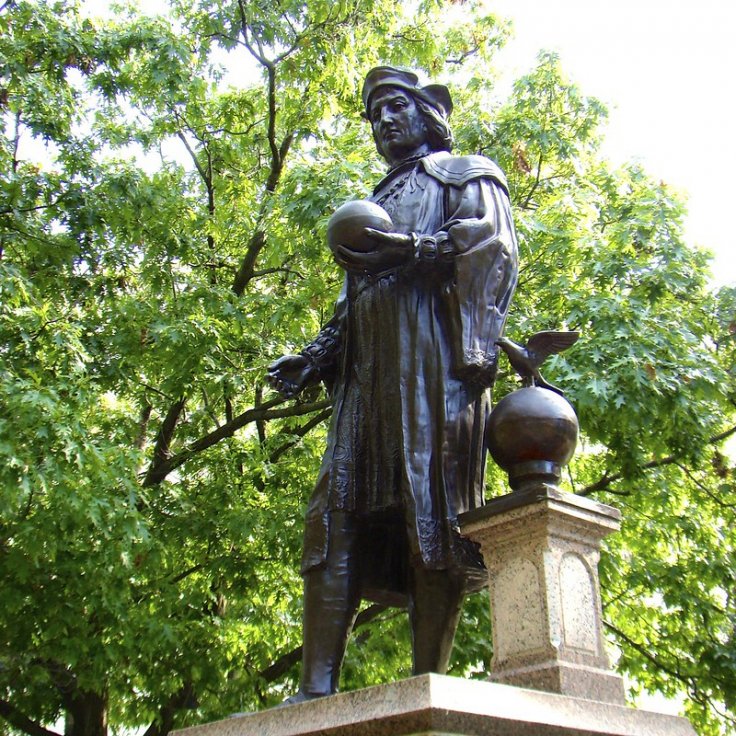Columbus Day is an annual U.S. holiday to commemorate Christopher Columbus' landing in the Americas in 1492. The day is celebrated on the second Monday of October and this year the holiday falls on Oct. 12.
Columbus Day was declared a federal holiday in 1937. Until then it was celebrated unofficially across various cities in the U.S. However, in recent decades, the day has also become one of the most controversial holidays in the ethnically and racially diverse country.
Why is Columbus Day Celebrated in the U.S.?
For many Americans, Columbus has been a figure of pride and the main idea behind observing the day was to honor his achievements. The day was first celebrated in 1792 when New York's Columbian Order — popularly known as Tammany Hall — held an event marking 300th anniversary of the Italian voyager's landing in the Americas. The goal was to celebrate and take pride in his Italian heritage and faith — Catholicism.
On the 400th anniversary of the landing, the then-President Benjamin Harrison urged Americans to view the day with patriotism and appreciate the "the great achievements of the four completed centuries of American life." The day was ultimately declared a federal holiday in 1937 by President Franklin Roosevelt reportedly under the pressure from dominant Catholic fraternal organization the Knights of Columbus.

Christopher Columbus — A Divisive Figure
While the Italian voyager occupies a place of honor and pride in several Americans, he is also seen a divisive figure. Much of the controversy surrounding Columbus Day stems from the fact that Columbus enslaved Native American Taíno tribes, who — according to the voyager and his men — would make "good servants." After Columbus established the first American colony at La Isabela, the Spaniards removed the indigenous people from their villages and made them work in gold mines and colonial plantations. He also allegedly imposed brutal forms of punishment, including torture.
"They will give all that they do possess for anything that is given to them, exchanging things even for bits of broken crockery," Columbus noted of the Taíno tribesmen after meeting them in the Bahamas in 1492, according to Smithsonian Magazine. "They were very well built, with very handsome bodies and very good faces. ... They do not carry arms or know them. ... They should be good servants."
Moreover, the European settlers brought diseases such as smallpox and measles with them that infected the natives. Hundreds of the indigenous were defeated by the Spaniards, who outnumbered them. By the early 1500s, as many as three million or about 85 percent of the Taíno population was wiped out, Smithsonian Magazine reported, citing Spanish records.
Symbol of Racism for Modern Americans
Modern Americans have rejected Columbus as a figure of pride and began associating him with racism and hate. In recent months, cities across the U.S. pulled down statues of Confederate soldiers. However, Columbus' statues were largely spared.
But in June, protesters in Virginia took down a Columbus statue, set it ablaze and threw it into a lake — a move that was viewed as bold and further triggered a debate on the voyager's legacy.

In New York City, nonprofit American Indian Community House called for the removal of Columbus' 14-foot statue that has been at Columbus Circle outside Central Park for 128 years. The nonprofit's executive director Melissa Iakowi:he'ne' Oake said New York City did not need a statue of a person who enslaved and destroyed indigenous people.
"I think with everything that is going on now ... I don't see why (the city) would have an argument against keeping the Christopher Columbus statue," she told ABC News.
A spokeswoman for the mayor said the city would not remove the statue based on a commission's report but will work to "add context to the monument and honor Indigenous Peoples."
However, Oakes noted that having the statue look down on the indigenous community was degrading. "They don't care, and they don't accept it," she said.
Alternate Holidays
In Latin American nations, Columbus' landing has been observed as the Dìa de la Raza or the Day of the Race, which celebrated the diverse roots of Hispanic culture. In 2002, Venezuela changed the name of the holiday to Dìa de la Resistencia Indìgena — "Day of Indigenous Resistance" — to recognize native people and their history.
Additionally, American states such as Alaska, Hawaii and Oregon celebrate the day as Indigenous Peoples' Day.









